The Entrepreneurship and Small Business Management | Assignment
VerifiedAdded on 2021/01/02
|18
|5707
|222
AI Summary
Contribute Materials
Your contribution can guide someone’s learning journey. Share your
documents today.

Entrepreneurship and
Small Business
Management
Small Business
Management
Secure Best Marks with AI Grader
Need help grading? Try our AI Grader for instant feedback on your assignments.
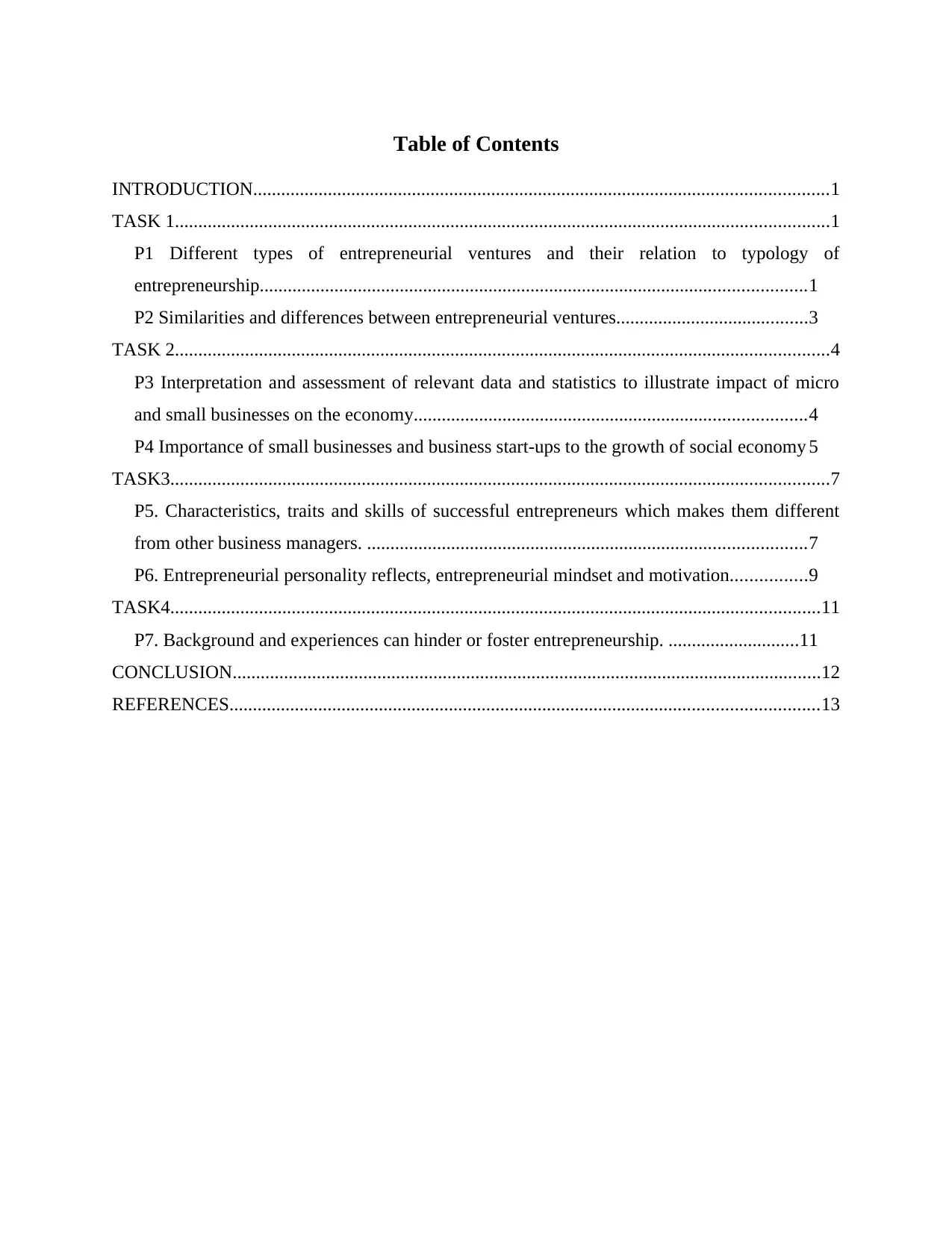
Table of Contents
INTRODUCTION...........................................................................................................................1
TASK 1............................................................................................................................................1
P1 Different types of entrepreneurial ventures and their relation to typology of
entrepreneurship.....................................................................................................................1
P2 Similarities and differences between entrepreneurial ventures.........................................3
TASK 2............................................................................................................................................4
P3 Interpretation and assessment of relevant data and statistics to illustrate impact of micro
and small businesses on the economy....................................................................................4
P4 Importance of small businesses and business start-ups to the growth of social economy 5
TASK3.............................................................................................................................................7
P5. Characteristics, traits and skills of successful entrepreneurs which makes them different
from other business managers. ..............................................................................................7
P6. Entrepreneurial personality reflects, entrepreneurial mindset and motivation................9
TASK4...........................................................................................................................................11
P7. Background and experiences can hinder or foster entrepreneurship. ............................11
CONCLUSION..............................................................................................................................12
REFERENCES..............................................................................................................................13
INTRODUCTION...........................................................................................................................1
TASK 1............................................................................................................................................1
P1 Different types of entrepreneurial ventures and their relation to typology of
entrepreneurship.....................................................................................................................1
P2 Similarities and differences between entrepreneurial ventures.........................................3
TASK 2............................................................................................................................................4
P3 Interpretation and assessment of relevant data and statistics to illustrate impact of micro
and small businesses on the economy....................................................................................4
P4 Importance of small businesses and business start-ups to the growth of social economy 5
TASK3.............................................................................................................................................7
P5. Characteristics, traits and skills of successful entrepreneurs which makes them different
from other business managers. ..............................................................................................7
P6. Entrepreneurial personality reflects, entrepreneurial mindset and motivation................9
TASK4...........................................................................................................................................11
P7. Background and experiences can hinder or foster entrepreneurship. ............................11
CONCLUSION..............................................................................................................................12
REFERENCES..............................................................................................................................13
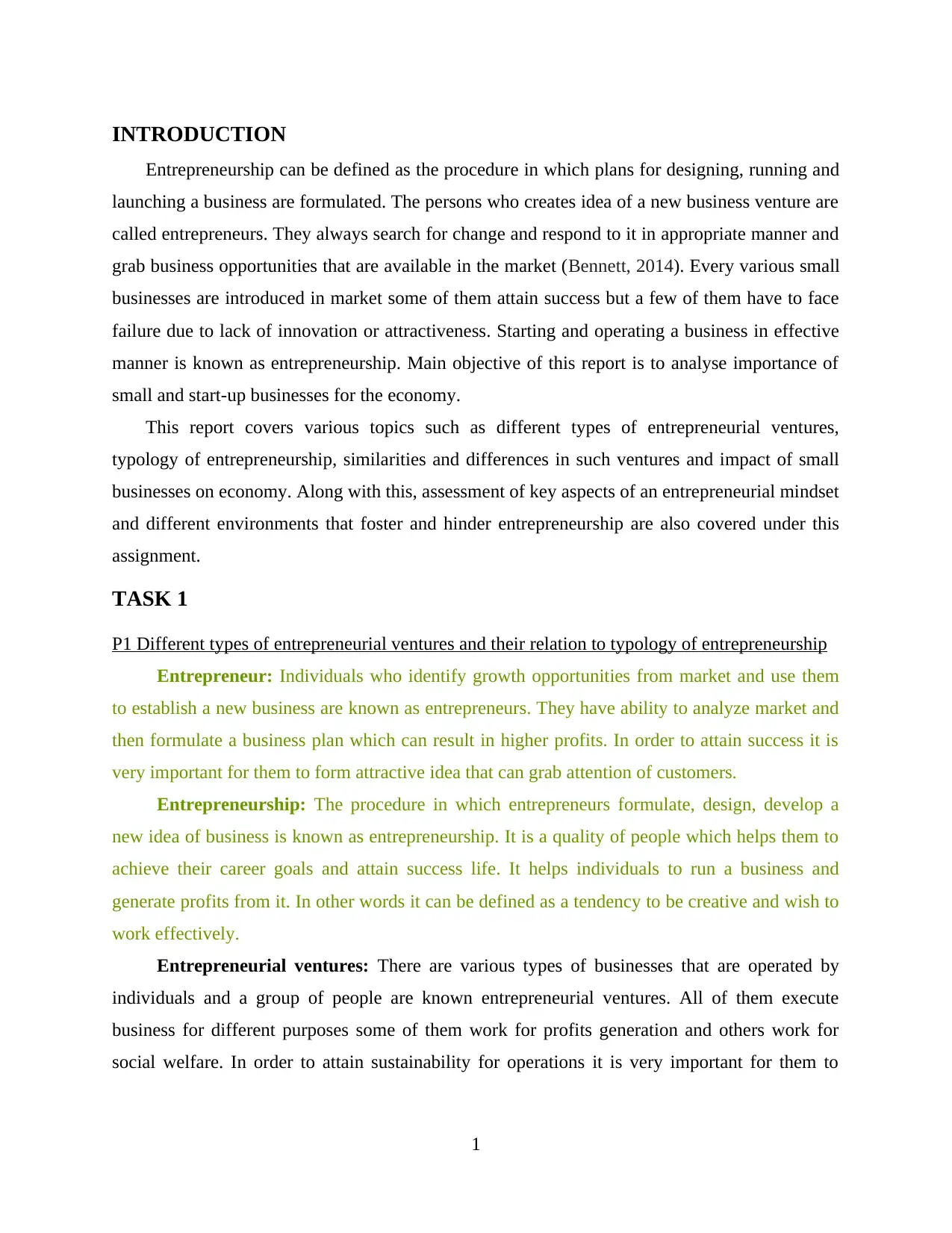
INTRODUCTION
Entrepreneurship can be defined as the procedure in which plans for designing, running and
launching a business are formulated. The persons who creates idea of a new business venture are
called entrepreneurs. They always search for change and respond to it in appropriate manner and
grab business opportunities that are available in the market (Bennett, 2014). Every various small
businesses are introduced in market some of them attain success but a few of them have to face
failure due to lack of innovation or attractiveness. Starting and operating a business in effective
manner is known as entrepreneurship. Main objective of this report is to analyse importance of
small and start-up businesses for the economy.
This report covers various topics such as different types of entrepreneurial ventures,
typology of entrepreneurship, similarities and differences in such ventures and impact of small
businesses on economy. Along with this, assessment of key aspects of an entrepreneurial mindset
and different environments that foster and hinder entrepreneurship are also covered under this
assignment.
TASK 1
P1 Different types of entrepreneurial ventures and their relation to typology of entrepreneurship
Entrepreneur: Individuals who identify growth opportunities from market and use them
to establish a new business are known as entrepreneurs. They have ability to analyze market and
then formulate a business plan which can result in higher profits. In order to attain success it is
very important for them to form attractive idea that can grab attention of customers.
Entrepreneurship: The procedure in which entrepreneurs formulate, design, develop a
new idea of business is known as entrepreneurship. It is a quality of people which helps them to
achieve their career goals and attain success life. It helps individuals to run a business and
generate profits from it. In other words it can be defined as a tendency to be creative and wish to
work effectively.
Entrepreneurial ventures: There are various types of businesses that are operated by
individuals and a group of people are known entrepreneurial ventures. All of them execute
business for different purposes some of them work for profits generation and others work for
social welfare. In order to attain sustainability for operations it is very important for them to
1
Entrepreneurship can be defined as the procedure in which plans for designing, running and
launching a business are formulated. The persons who creates idea of a new business venture are
called entrepreneurs. They always search for change and respond to it in appropriate manner and
grab business opportunities that are available in the market (Bennett, 2014). Every various small
businesses are introduced in market some of them attain success but a few of them have to face
failure due to lack of innovation or attractiveness. Starting and operating a business in effective
manner is known as entrepreneurship. Main objective of this report is to analyse importance of
small and start-up businesses for the economy.
This report covers various topics such as different types of entrepreneurial ventures,
typology of entrepreneurship, similarities and differences in such ventures and impact of small
businesses on economy. Along with this, assessment of key aspects of an entrepreneurial mindset
and different environments that foster and hinder entrepreneurship are also covered under this
assignment.
TASK 1
P1 Different types of entrepreneurial ventures and their relation to typology of entrepreneurship
Entrepreneur: Individuals who identify growth opportunities from market and use them
to establish a new business are known as entrepreneurs. They have ability to analyze market and
then formulate a business plan which can result in higher profits. In order to attain success it is
very important for them to form attractive idea that can grab attention of customers.
Entrepreneurship: The procedure in which entrepreneurs formulate, design, develop a
new idea of business is known as entrepreneurship. It is a quality of people which helps them to
achieve their career goals and attain success life. It helps individuals to run a business and
generate profits from it. In other words it can be defined as a tendency to be creative and wish to
work effectively.
Entrepreneurial ventures: There are various types of businesses that are operated by
individuals and a group of people are known entrepreneurial ventures. All of them execute
business for different purposes some of them work for profits generation and others work for
social welfare. In order to attain sustainability for operations it is very important for them to
1
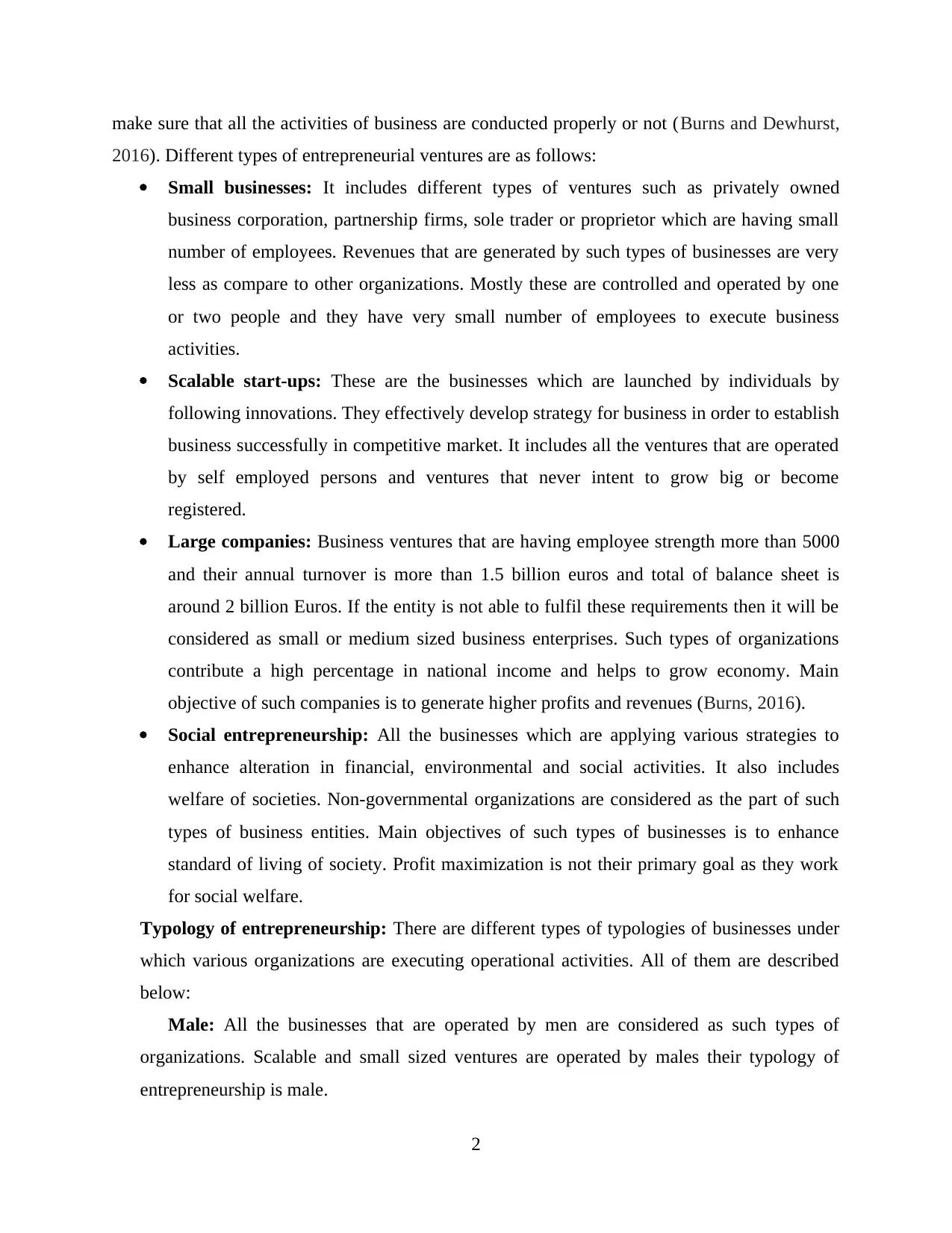
make sure that all the activities of business are conducted properly or not (Burns and Dewhurst,
2016). Different types of entrepreneurial ventures are as follows:
Small businesses: It includes different types of ventures such as privately owned
business corporation, partnership firms, sole trader or proprietor which are having small
number of employees. Revenues that are generated by such types of businesses are very
less as compare to other organizations. Mostly these are controlled and operated by one
or two people and they have very small number of employees to execute business
activities.
Scalable start-ups: These are the businesses which are launched by individuals by
following innovations. They effectively develop strategy for business in order to establish
business successfully in competitive market. It includes all the ventures that are operated
by self employed persons and ventures that never intent to grow big or become
registered.
Large companies: Business ventures that are having employee strength more than 5000
and their annual turnover is more than 1.5 billion euros and total of balance sheet is
around 2 billion Euros. If the entity is not able to fulfil these requirements then it will be
considered as small or medium sized business enterprises. Such types of organizations
contribute a high percentage in national income and helps to grow economy. Main
objective of such companies is to generate higher profits and revenues (Burns, 2016).
Social entrepreneurship: All the businesses which are applying various strategies to
enhance alteration in financial, environmental and social activities. It also includes
welfare of societies. Non-governmental organizations are considered as the part of such
types of business entities. Main objectives of such types of businesses is to enhance
standard of living of society. Profit maximization is not their primary goal as they work
for social welfare.
Typology of entrepreneurship: There are different types of typologies of businesses under
which various organizations are executing operational activities. All of them are described
below:
Male: All the businesses that are operated by men are considered as such types of
organizations. Scalable and small sized ventures are operated by males their typology of
entrepreneurship is male.
2
2016). Different types of entrepreneurial ventures are as follows:
Small businesses: It includes different types of ventures such as privately owned
business corporation, partnership firms, sole trader or proprietor which are having small
number of employees. Revenues that are generated by such types of businesses are very
less as compare to other organizations. Mostly these are controlled and operated by one
or two people and they have very small number of employees to execute business
activities.
Scalable start-ups: These are the businesses which are launched by individuals by
following innovations. They effectively develop strategy for business in order to establish
business successfully in competitive market. It includes all the ventures that are operated
by self employed persons and ventures that never intent to grow big or become
registered.
Large companies: Business ventures that are having employee strength more than 5000
and their annual turnover is more than 1.5 billion euros and total of balance sheet is
around 2 billion Euros. If the entity is not able to fulfil these requirements then it will be
considered as small or medium sized business enterprises. Such types of organizations
contribute a high percentage in national income and helps to grow economy. Main
objective of such companies is to generate higher profits and revenues (Burns, 2016).
Social entrepreneurship: All the businesses which are applying various strategies to
enhance alteration in financial, environmental and social activities. It also includes
welfare of societies. Non-governmental organizations are considered as the part of such
types of business entities. Main objectives of such types of businesses is to enhance
standard of living of society. Profit maximization is not their primary goal as they work
for social welfare.
Typology of entrepreneurship: There are different types of typologies of businesses under
which various organizations are executing operational activities. All of them are described
below:
Male: All the businesses that are operated by men are considered as such types of
organizations. Scalable and small sized ventures are operated by males their typology of
entrepreneurship is male.
2
Secure Best Marks with AI Grader
Need help grading? Try our AI Grader for instant feedback on your assignments.
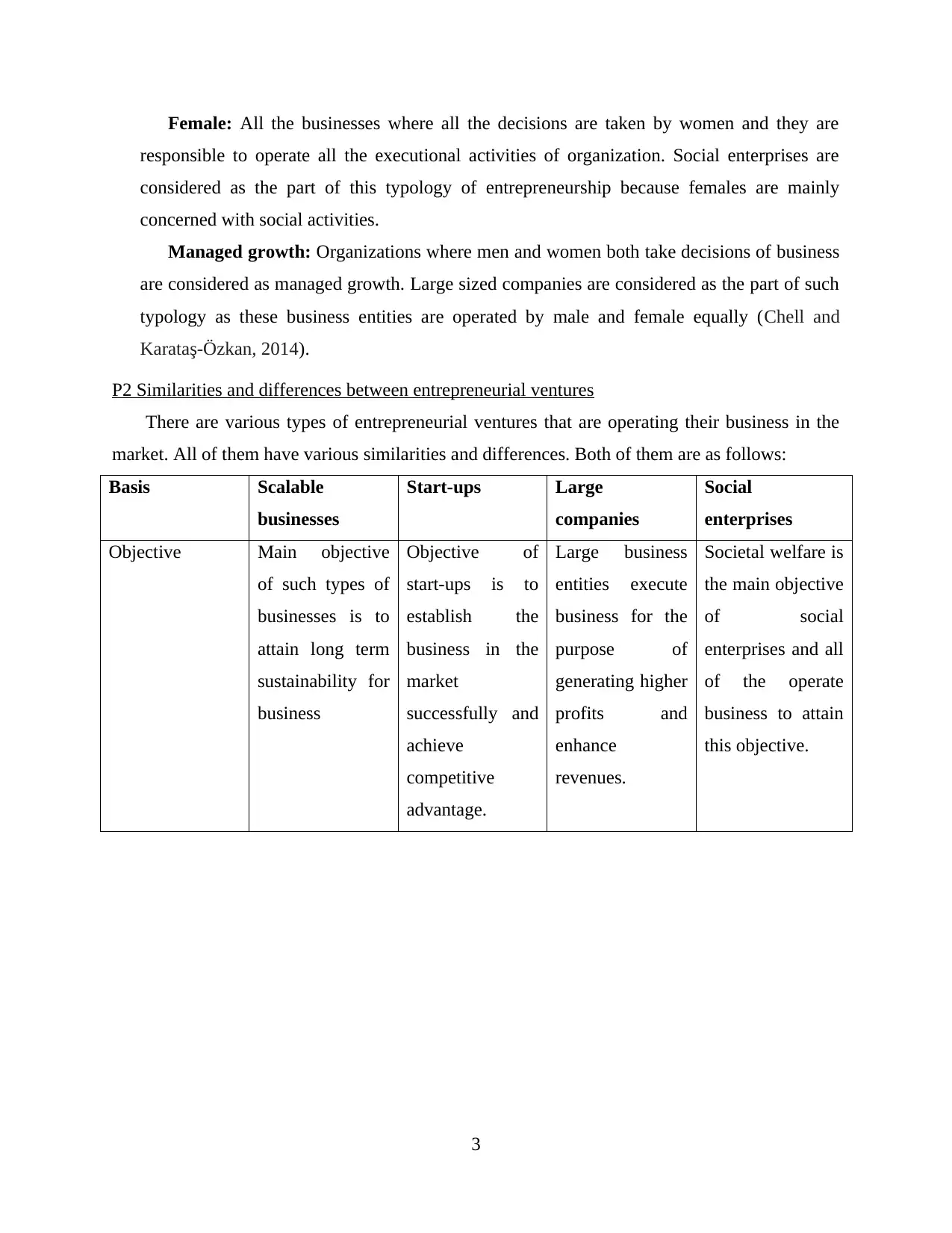
Female: All the businesses where all the decisions are taken by women and they are
responsible to operate all the executional activities of organization. Social enterprises are
considered as the part of this typology of entrepreneurship because females are mainly
concerned with social activities.
Managed growth: Organizations where men and women both take decisions of business
are considered as managed growth. Large sized companies are considered as the part of such
typology as these business entities are operated by male and female equally (Chell and
Karataş-Özkan, 2014).
P2 Similarities and differences between entrepreneurial ventures
There are various types of entrepreneurial ventures that are operating their business in the
market. All of them have various similarities and differences. Both of them are as follows:
Basis Scalable
businesses
Start-ups Large
companies
Social
enterprises
Objective Main objective
of such types of
businesses is to
attain long term
sustainability for
business
Objective of
start-ups is to
establish the
business in the
market
successfully and
achieve
competitive
advantage.
Large business
entities execute
business for the
purpose of
generating higher
profits and
enhance
revenues.
Societal welfare is
the main objective
of social
enterprises and all
of the operate
business to attain
this objective.
3
responsible to operate all the executional activities of organization. Social enterprises are
considered as the part of this typology of entrepreneurship because females are mainly
concerned with social activities.
Managed growth: Organizations where men and women both take decisions of business
are considered as managed growth. Large sized companies are considered as the part of such
typology as these business entities are operated by male and female equally (Chell and
Karataş-Özkan, 2014).
P2 Similarities and differences between entrepreneurial ventures
There are various types of entrepreneurial ventures that are operating their business in the
market. All of them have various similarities and differences. Both of them are as follows:
Basis Scalable
businesses
Start-ups Large
companies
Social
enterprises
Objective Main objective
of such types of
businesses is to
attain long term
sustainability for
business
Objective of
start-ups is to
establish the
business in the
market
successfully and
achieve
competitive
advantage.
Large business
entities execute
business for the
purpose of
generating higher
profits and
enhance
revenues.
Societal welfare is
the main objective
of social
enterprises and all
of the operate
business to attain
this objective.
3
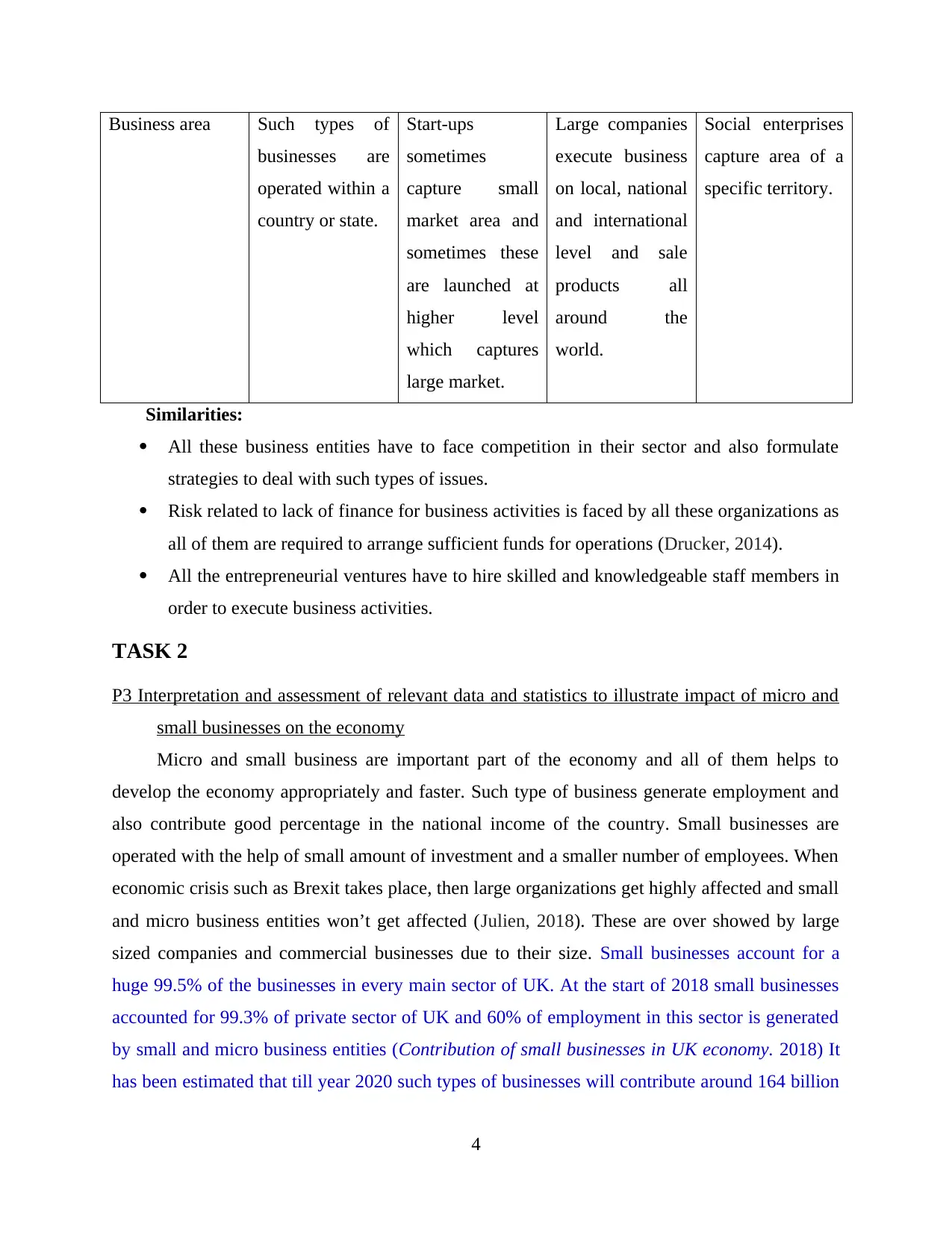
Business area Such types of
businesses are
operated within a
country or state.
Start-ups
sometimes
capture small
market area and
sometimes these
are launched at
higher level
which captures
large market.
Large companies
execute business
on local, national
and international
level and sale
products all
around the
world.
Social enterprises
capture area of a
specific territory.
Similarities:
All these business entities have to face competition in their sector and also formulate
strategies to deal with such types of issues.
Risk related to lack of finance for business activities is faced by all these organizations as
all of them are required to arrange sufficient funds for operations (Drucker, 2014).
All the entrepreneurial ventures have to hire skilled and knowledgeable staff members in
order to execute business activities.
TASK 2
P3 Interpretation and assessment of relevant data and statistics to illustrate impact of micro and
small businesses on the economy
Micro and small business are important part of the economy and all of them helps to
develop the economy appropriately and faster. Such type of business generate employment and
also contribute good percentage in the national income of the country. Small businesses are
operated with the help of small amount of investment and a smaller number of employees. When
economic crisis such as Brexit takes place, then large organizations get highly affected and small
and micro business entities won’t get affected (Julien, 2018). These are over showed by large
sized companies and commercial businesses due to their size. Small businesses account for a
huge 99.5% of the businesses in every main sector of UK. At the start of 2018 small businesses
accounted for 99.3% of private sector of UK and 60% of employment in this sector is generated
by small and micro business entities (Contribution of small businesses in UK economy. 2018) It
has been estimated that till year 2020 such types of businesses will contribute around 164 billion
4
businesses are
operated within a
country or state.
Start-ups
sometimes
capture small
market area and
sometimes these
are launched at
higher level
which captures
large market.
Large companies
execute business
on local, national
and international
level and sale
products all
around the
world.
Social enterprises
capture area of a
specific territory.
Similarities:
All these business entities have to face competition in their sector and also formulate
strategies to deal with such types of issues.
Risk related to lack of finance for business activities is faced by all these organizations as
all of them are required to arrange sufficient funds for operations (Drucker, 2014).
All the entrepreneurial ventures have to hire skilled and knowledgeable staff members in
order to execute business activities.
TASK 2
P3 Interpretation and assessment of relevant data and statistics to illustrate impact of micro and
small businesses on the economy
Micro and small business are important part of the economy and all of them helps to
develop the economy appropriately and faster. Such type of business generate employment and
also contribute good percentage in the national income of the country. Small businesses are
operated with the help of small amount of investment and a smaller number of employees. When
economic crisis such as Brexit takes place, then large organizations get highly affected and small
and micro business entities won’t get affected (Julien, 2018). These are over showed by large
sized companies and commercial businesses due to their size. Small businesses account for a
huge 99.5% of the businesses in every main sector of UK. At the start of 2018 small businesses
accounted for 99.3% of private sector of UK and 60% of employment in this sector is generated
by small and micro business entities (Contribution of small businesses in UK economy. 2018) It
has been estimated that till year 2020 such types of businesses will contribute around 164 billion
4
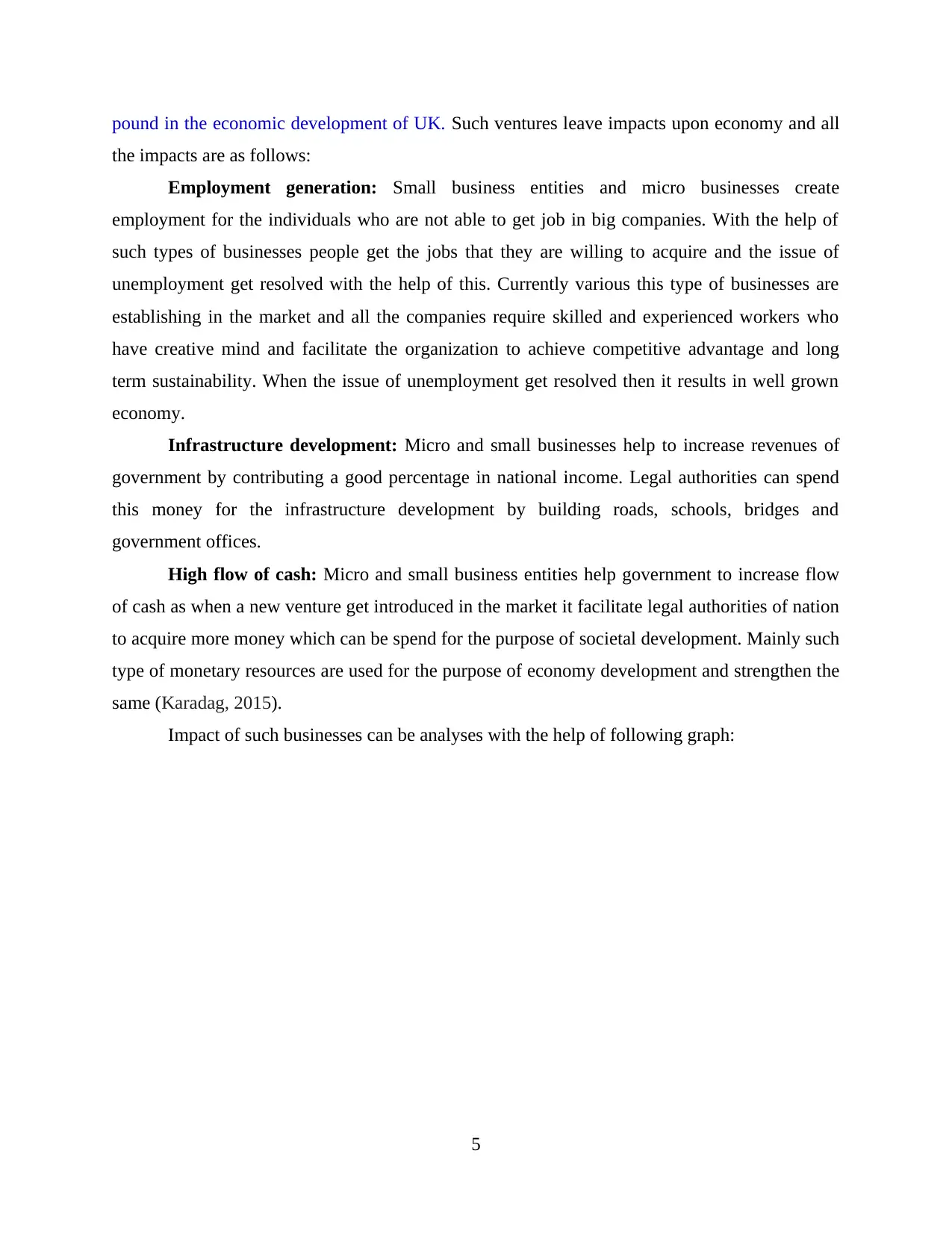
pound in the economic development of UK. Such ventures leave impacts upon economy and all
the impacts are as follows:
Employment generation: Small business entities and micro businesses create
employment for the individuals who are not able to get job in big companies. With the help of
such types of businesses people get the jobs that they are willing to acquire and the issue of
unemployment get resolved with the help of this. Currently various this type of businesses are
establishing in the market and all the companies require skilled and experienced workers who
have creative mind and facilitate the organization to achieve competitive advantage and long
term sustainability. When the issue of unemployment get resolved then it results in well grown
economy.
Infrastructure development: Micro and small businesses help to increase revenues of
government by contributing a good percentage in national income. Legal authorities can spend
this money for the infrastructure development by building roads, schools, bridges and
government offices.
High flow of cash: Micro and small business entities help government to increase flow
of cash as when a new venture get introduced in the market it facilitate legal authorities of nation
to acquire more money which can be spend for the purpose of societal development. Mainly such
type of monetary resources are used for the purpose of economy development and strengthen the
same (Karadag, 2015).
Impact of such businesses can be analyses with the help of following graph:
5
the impacts are as follows:
Employment generation: Small business entities and micro businesses create
employment for the individuals who are not able to get job in big companies. With the help of
such types of businesses people get the jobs that they are willing to acquire and the issue of
unemployment get resolved with the help of this. Currently various this type of businesses are
establishing in the market and all the companies require skilled and experienced workers who
have creative mind and facilitate the organization to achieve competitive advantage and long
term sustainability. When the issue of unemployment get resolved then it results in well grown
economy.
Infrastructure development: Micro and small businesses help to increase revenues of
government by contributing a good percentage in national income. Legal authorities can spend
this money for the infrastructure development by building roads, schools, bridges and
government offices.
High flow of cash: Micro and small business entities help government to increase flow
of cash as when a new venture get introduced in the market it facilitate legal authorities of nation
to acquire more money which can be spend for the purpose of societal development. Mainly such
type of monetary resources are used for the purpose of economy development and strengthen the
same (Karadag, 2015).
Impact of such businesses can be analyses with the help of following graph:
5
Paraphrase This Document
Need a fresh take? Get an instant paraphrase of this document with our AI Paraphraser
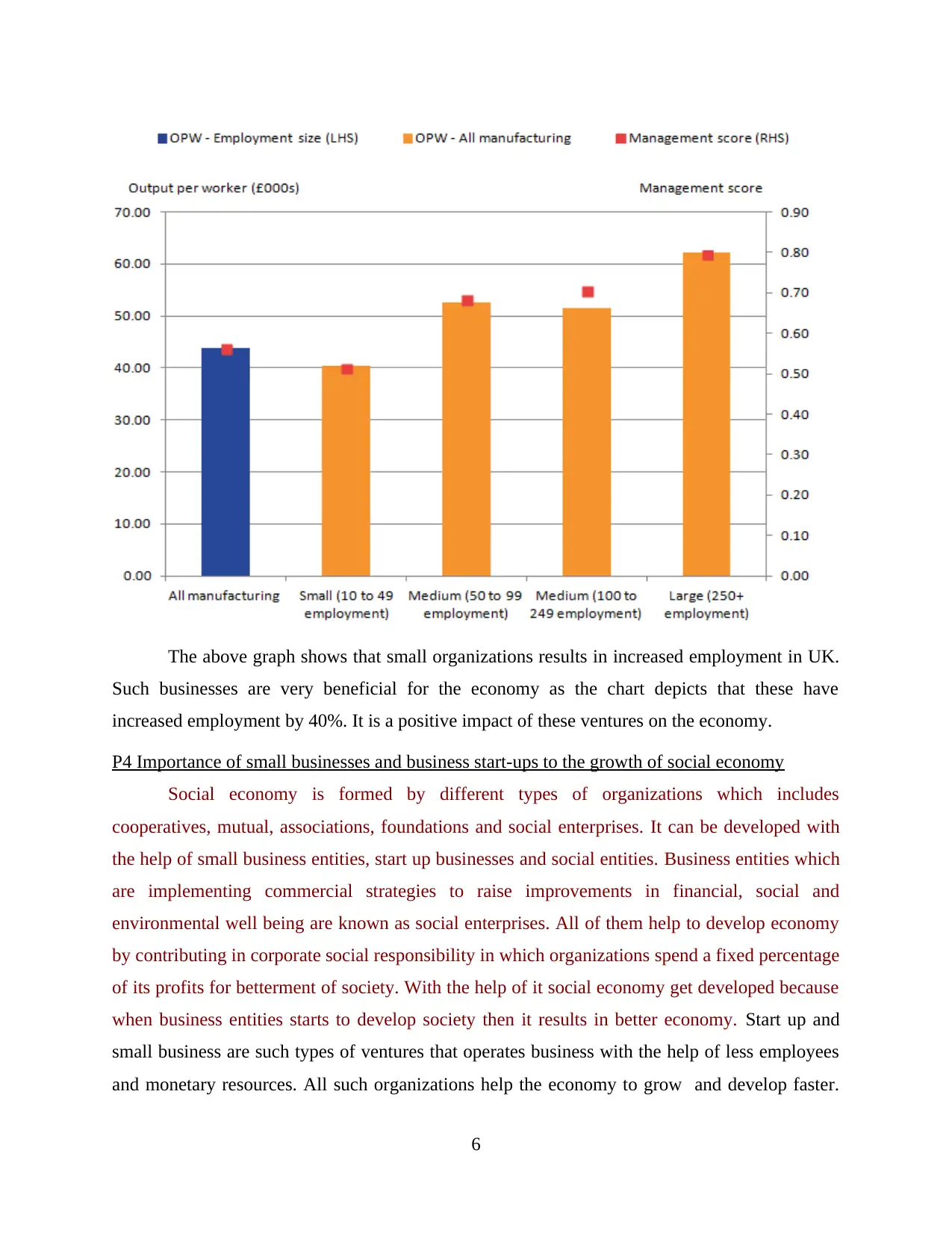
The above graph shows that small organizations results in increased employment in UK.
Such businesses are very beneficial for the economy as the chart depicts that these have
increased employment by 40%. It is a positive impact of these ventures on the economy.
P4 Importance of small businesses and business start-ups to the growth of social economy
Social economy is formed by different types of organizations which includes
cooperatives, mutual, associations, foundations and social enterprises. It can be developed with
the help of small business entities, start up businesses and social entities. Business entities which
are implementing commercial strategies to raise improvements in financial, social and
environmental well being are known as social enterprises. All of them help to develop economy
by contributing in corporate social responsibility in which organizations spend a fixed percentage
of its profits for betterment of society. With the help of it social economy get developed because
when business entities starts to develop society then it results in better economy. Start up and
small business are such types of ventures that operates business with the help of less employees
and monetary resources. All such organizations help the economy to grow and develop faster.
6
Such businesses are very beneficial for the economy as the chart depicts that these have
increased employment by 40%. It is a positive impact of these ventures on the economy.
P4 Importance of small businesses and business start-ups to the growth of social economy
Social economy is formed by different types of organizations which includes
cooperatives, mutual, associations, foundations and social enterprises. It can be developed with
the help of small business entities, start up businesses and social entities. Business entities which
are implementing commercial strategies to raise improvements in financial, social and
environmental well being are known as social enterprises. All of them help to develop economy
by contributing in corporate social responsibility in which organizations spend a fixed percentage
of its profits for betterment of society. With the help of it social economy get developed because
when business entities starts to develop society then it results in better economy. Start up and
small business are such types of ventures that operates business with the help of less employees
and monetary resources. All such organizations help the economy to grow and develop faster.
6
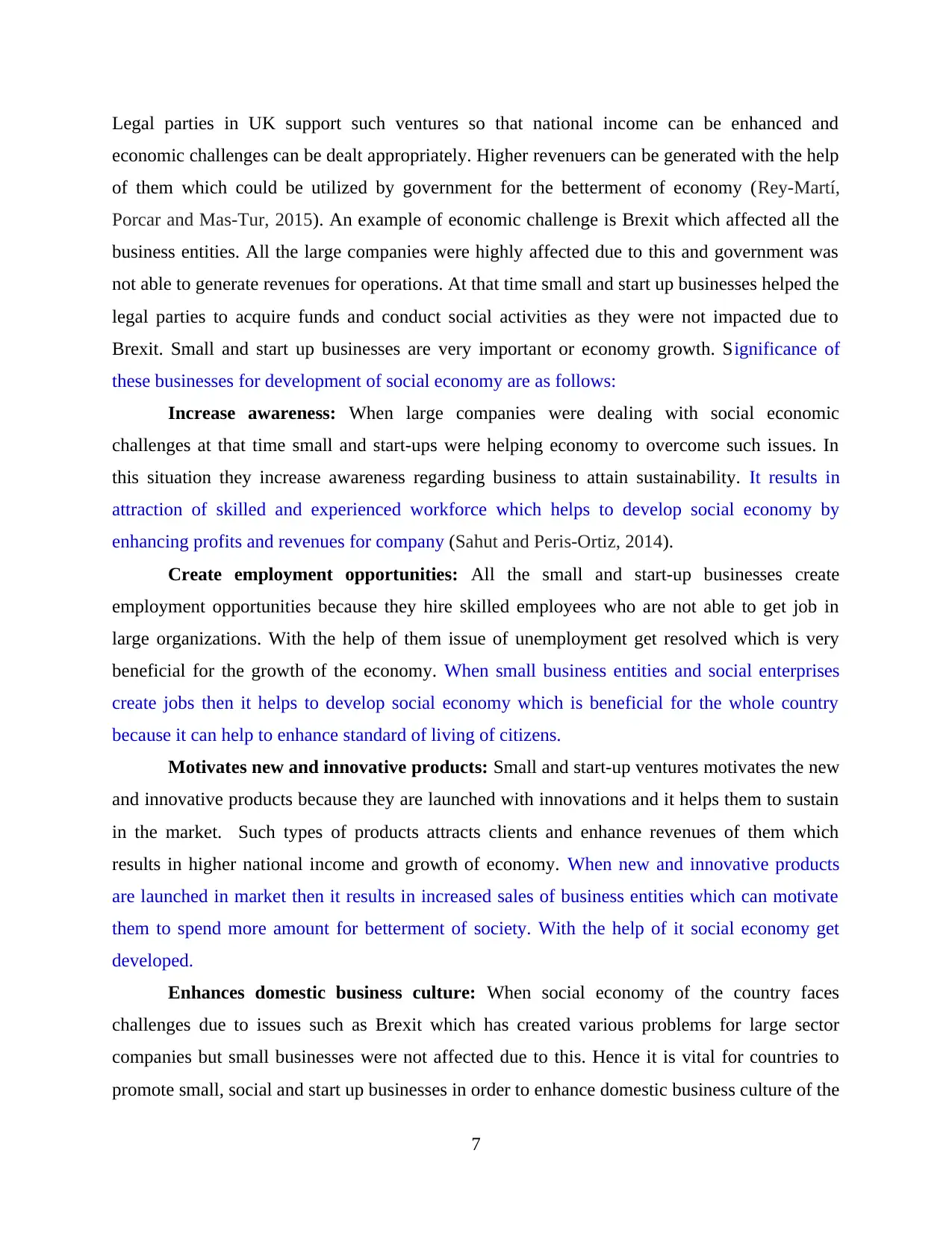
Legal parties in UK support such ventures so that national income can be enhanced and
economic challenges can be dealt appropriately. Higher revenuers can be generated with the help
of them which could be utilized by government for the betterment of economy (Rey-Martí,
Porcar and Mas-Tur, 2015). An example of economic challenge is Brexit which affected all the
business entities. All the large companies were highly affected due to this and government was
not able to generate revenues for operations. At that time small and start up businesses helped the
legal parties to acquire funds and conduct social activities as they were not impacted due to
Brexit. Small and start up businesses are very important or economy growth. Significance of
these businesses for development of social economy are as follows:
Increase awareness: When large companies were dealing with social economic
challenges at that time small and start-ups were helping economy to overcome such issues. In
this situation they increase awareness regarding business to attain sustainability. It results in
attraction of skilled and experienced workforce which helps to develop social economy by
enhancing profits and revenues for company (Sahut and Peris-Ortiz, 2014).
Create employment opportunities: All the small and start-up businesses create
employment opportunities because they hire skilled employees who are not able to get job in
large organizations. With the help of them issue of unemployment get resolved which is very
beneficial for the growth of the economy. When small business entities and social enterprises
create jobs then it helps to develop social economy which is beneficial for the whole country
because it can help to enhance standard of living of citizens.
Motivates new and innovative products: Small and start-up ventures motivates the new
and innovative products because they are launched with innovations and it helps them to sustain
in the market. Such types of products attracts clients and enhance revenues of them which
results in higher national income and growth of economy. When new and innovative products
are launched in market then it results in increased sales of business entities which can motivate
them to spend more amount for betterment of society. With the help of it social economy get
developed.
Enhances domestic business culture: When social economy of the country faces
challenges due to issues such as Brexit which has created various problems for large sector
companies but small businesses were not affected due to this. Hence it is vital for countries to
promote small, social and start up businesses in order to enhance domestic business culture of the
7
economic challenges can be dealt appropriately. Higher revenuers can be generated with the help
of them which could be utilized by government for the betterment of economy (Rey-Martí,
Porcar and Mas-Tur, 2015). An example of economic challenge is Brexit which affected all the
business entities. All the large companies were highly affected due to this and government was
not able to generate revenues for operations. At that time small and start up businesses helped the
legal parties to acquire funds and conduct social activities as they were not impacted due to
Brexit. Small and start up businesses are very important or economy growth. Significance of
these businesses for development of social economy are as follows:
Increase awareness: When large companies were dealing with social economic
challenges at that time small and start-ups were helping economy to overcome such issues. In
this situation they increase awareness regarding business to attain sustainability. It results in
attraction of skilled and experienced workforce which helps to develop social economy by
enhancing profits and revenues for company (Sahut and Peris-Ortiz, 2014).
Create employment opportunities: All the small and start-up businesses create
employment opportunities because they hire skilled employees who are not able to get job in
large organizations. With the help of them issue of unemployment get resolved which is very
beneficial for the growth of the economy. When small business entities and social enterprises
create jobs then it helps to develop social economy which is beneficial for the whole country
because it can help to enhance standard of living of citizens.
Motivates new and innovative products: Small and start-up ventures motivates the new
and innovative products because they are launched with innovations and it helps them to sustain
in the market. Such types of products attracts clients and enhance revenues of them which
results in higher national income and growth of economy. When new and innovative products
are launched in market then it results in increased sales of business entities which can motivate
them to spend more amount for betterment of society. With the help of it social economy get
developed.
Enhances domestic business culture: When social economy of the country faces
challenges due to issues such as Brexit which has created various problems for large sector
companies but small businesses were not affected due to this. Hence it is vital for countries to
promote small, social and start up businesses in order to enhance domestic business culture of the
7
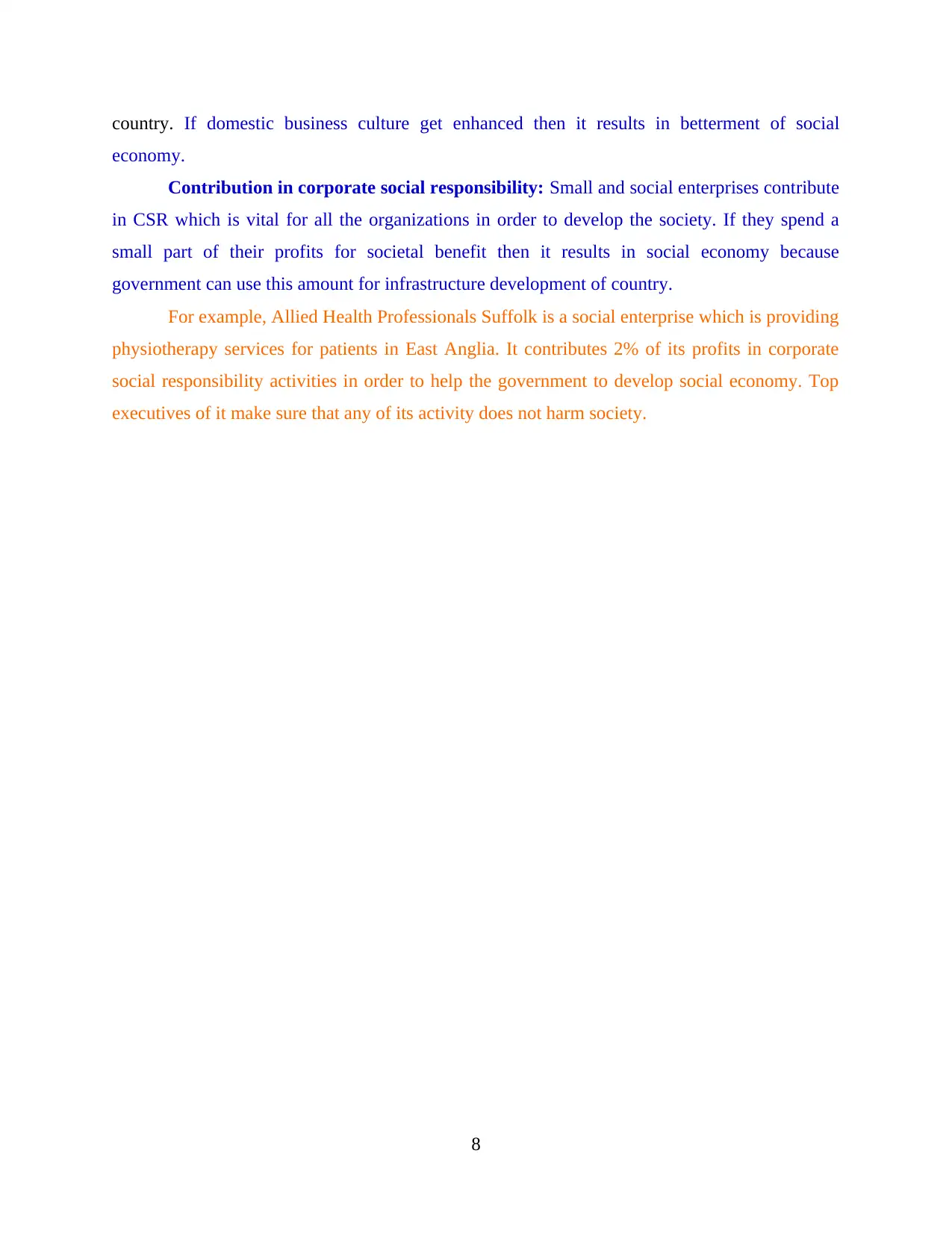
country. If domestic business culture get enhanced then it results in betterment of social
economy.
Contribution in corporate social responsibility: Small and social enterprises contribute
in CSR which is vital for all the organizations in order to develop the society. If they spend a
small part of their profits for societal benefit then it results in social economy because
government can use this amount for infrastructure development of country.
For example, Allied Health Professionals Suffolk is a social enterprise which is providing
physiotherapy services for patients in East Anglia. It contributes 2% of its profits in corporate
social responsibility activities in order to help the government to develop social economy. Top
executives of it make sure that any of its activity does not harm society.
8
economy.
Contribution in corporate social responsibility: Small and social enterprises contribute
in CSR which is vital for all the organizations in order to develop the society. If they spend a
small part of their profits for societal benefit then it results in social economy because
government can use this amount for infrastructure development of country.
For example, Allied Health Professionals Suffolk is a social enterprise which is providing
physiotherapy services for patients in East Anglia. It contributes 2% of its profits in corporate
social responsibility activities in order to help the government to develop social economy. Top
executives of it make sure that any of its activity does not harm society.
8
Secure Best Marks with AI Grader
Need help grading? Try our AI Grader for instant feedback on your assignments.
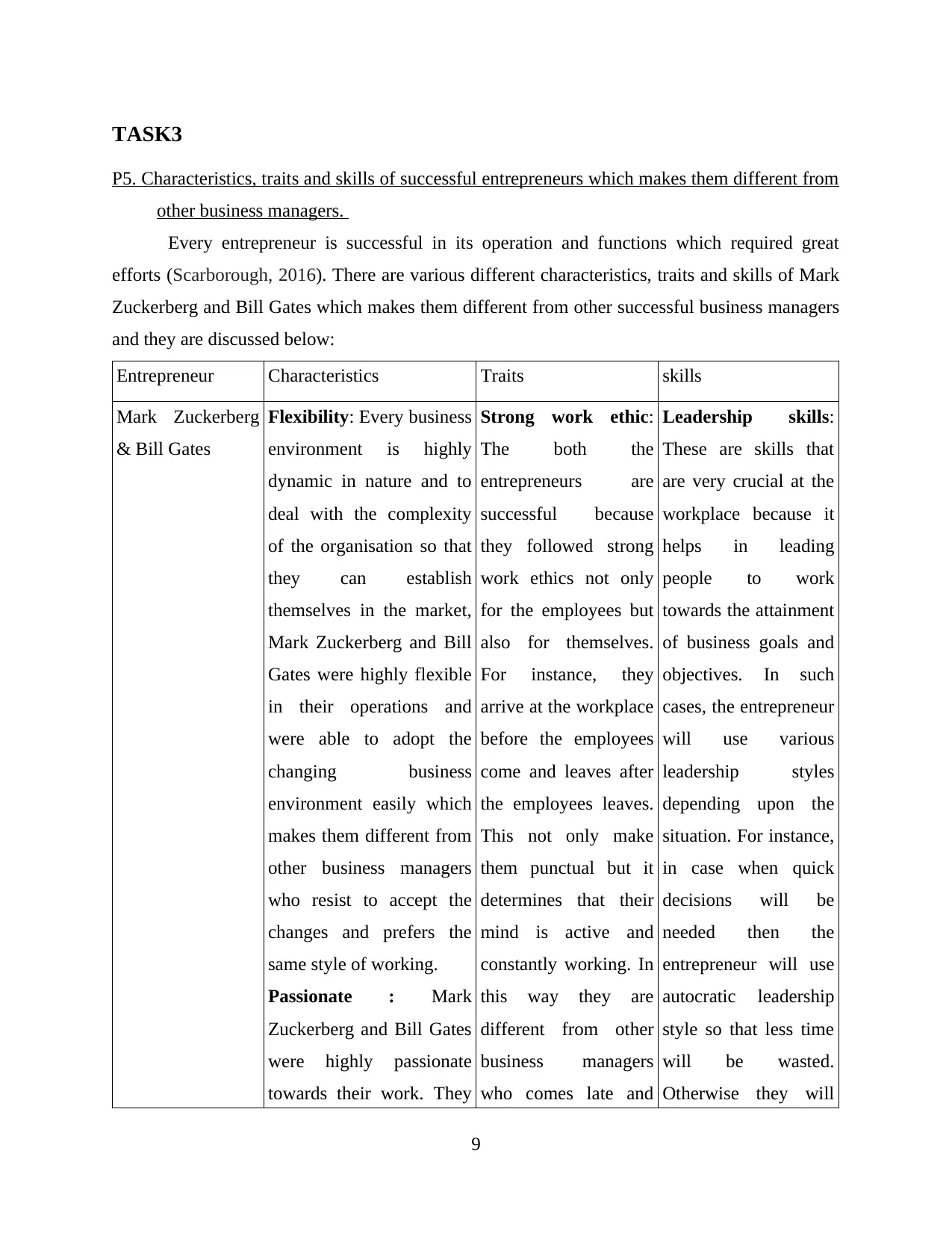
TASK3
P5. Characteristics, traits and skills of successful entrepreneurs which makes them different from
other business managers.
Every entrepreneur is successful in its operation and functions which required great
efforts (Scarborough, 2016). There are various different characteristics, traits and skills of Mark
Zuckerberg and Bill Gates which makes them different from other successful business managers
and they are discussed below:
Entrepreneur Characteristics Traits skills
Mark Zuckerberg
& Bill Gates
Flexibility: Every business
environment is highly
dynamic in nature and to
deal with the complexity
of the organisation so that
they can establish
themselves in the market,
Mark Zuckerberg and Bill
Gates were highly flexible
in their operations and
were able to adopt the
changing business
environment easily which
makes them different from
other business managers
who resist to accept the
changes and prefers the
same style of working.
Passionate : Mark
Zuckerberg and Bill Gates
were highly passionate
towards their work. They
Strong work ethic:
The both the
entrepreneurs are
successful because
they followed strong
work ethics not only
for the employees but
also for themselves.
For instance, they
arrive at the workplace
before the employees
come and leaves after
the employees leaves.
This not only make
them punctual but it
determines that their
mind is active and
constantly working. In
this way they are
different from other
business managers
who comes late and
Leadership skills:
These are skills that
are very crucial at the
workplace because it
helps in leading
people to work
towards the attainment
of business goals and
objectives. In such
cases, the entrepreneur
will use various
leadership styles
depending upon the
situation. For instance,
in case when quick
decisions will be
needed then the
entrepreneur will use
autocratic leadership
style so that less time
will be wasted.
Otherwise they will
9
P5. Characteristics, traits and skills of successful entrepreneurs which makes them different from
other business managers.
Every entrepreneur is successful in its operation and functions which required great
efforts (Scarborough, 2016). There are various different characteristics, traits and skills of Mark
Zuckerberg and Bill Gates which makes them different from other successful business managers
and they are discussed below:
Entrepreneur Characteristics Traits skills
Mark Zuckerberg
& Bill Gates
Flexibility: Every business
environment is highly
dynamic in nature and to
deal with the complexity
of the organisation so that
they can establish
themselves in the market,
Mark Zuckerberg and Bill
Gates were highly flexible
in their operations and
were able to adopt the
changing business
environment easily which
makes them different from
other business managers
who resist to accept the
changes and prefers the
same style of working.
Passionate : Mark
Zuckerberg and Bill Gates
were highly passionate
towards their work. They
Strong work ethic:
The both the
entrepreneurs are
successful because
they followed strong
work ethics not only
for the employees but
also for themselves.
For instance, they
arrive at the workplace
before the employees
come and leaves after
the employees leaves.
This not only make
them punctual but it
determines that their
mind is active and
constantly working. In
this way they are
different from other
business managers
who comes late and
Leadership skills:
These are skills that
are very crucial at the
workplace because it
helps in leading
people to work
towards the attainment
of business goals and
objectives. In such
cases, the entrepreneur
will use various
leadership styles
depending upon the
situation. For instance,
in case when quick
decisions will be
needed then the
entrepreneur will use
autocratic leadership
style so that less time
will be wasted.
Otherwise they will
9
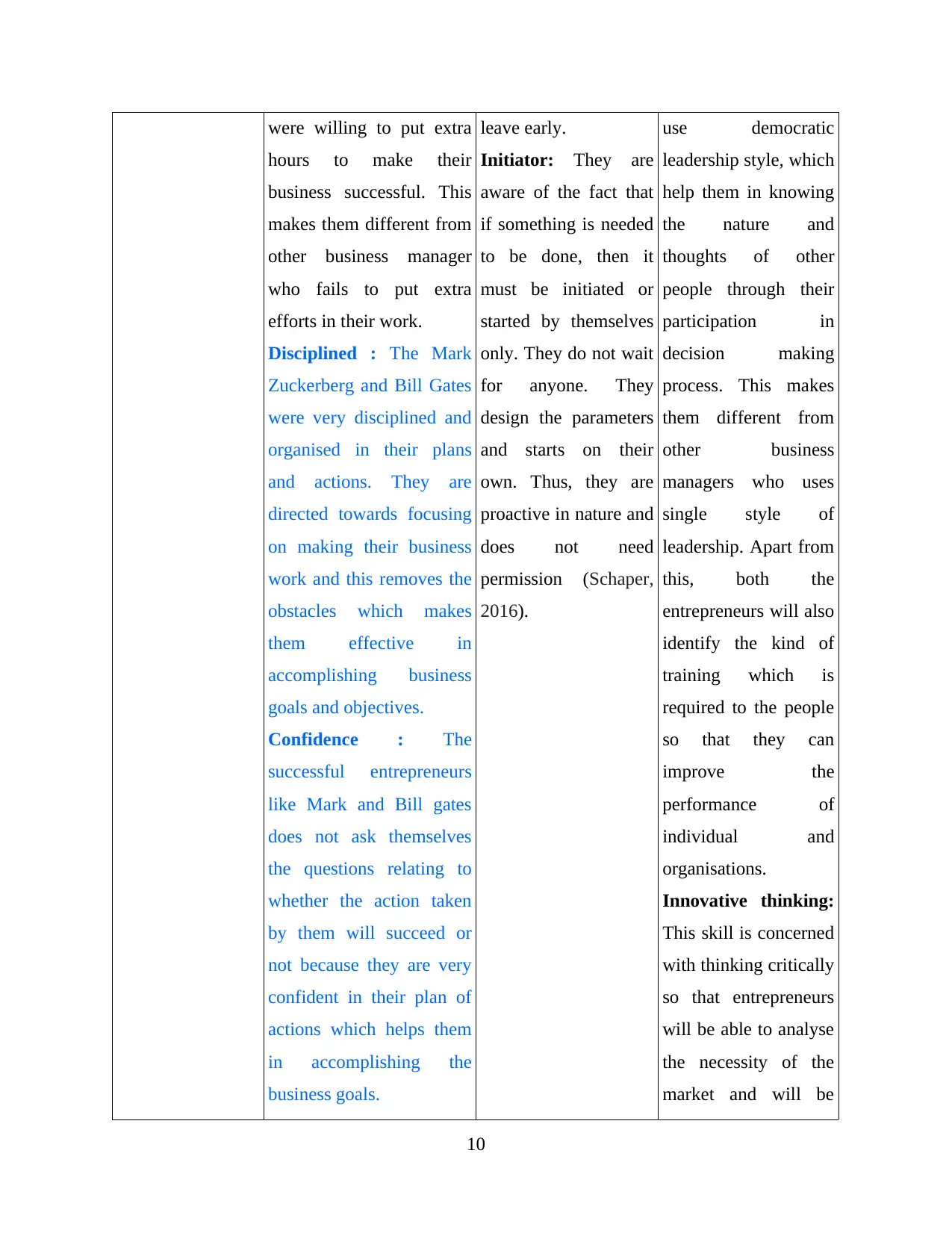
were willing to put extra
hours to make their
business successful. This
makes them different from
other business manager
who fails to put extra
efforts in their work.
Disciplined : The Mark
Zuckerberg and Bill Gates
were very disciplined and
organised in their plans
and actions. They are
directed towards focusing
on making their business
work and this removes the
obstacles which makes
them effective in
accomplishing business
goals and objectives.
Confidence : The
successful entrepreneurs
like Mark and Bill gates
does not ask themselves
the questions relating to
whether the action taken
by them will succeed or
not because they are very
confident in their plan of
actions which helps them
in accomplishing the
business goals.
leave early.
Initiator: They are
aware of the fact that
if something is needed
to be done, then it
must be initiated or
started by themselves
only. They do not wait
for anyone. They
design the parameters
and starts on their
own. Thus, they are
proactive in nature and
does not need
permission (Schaper,
2016).
use democratic
leadership style, which
help them in knowing
the nature and
thoughts of other
people through their
participation in
decision making
process. This makes
them different from
other business
managers who uses
single style of
leadership. Apart from
this, both the
entrepreneurs will also
identify the kind of
training which is
required to the people
so that they can
improve the
performance of
individual and
organisations.
Innovative thinking:
This skill is concerned
with thinking critically
so that entrepreneurs
will be able to analyse
the necessity of the
market and will be
10
hours to make their
business successful. This
makes them different from
other business manager
who fails to put extra
efforts in their work.
Disciplined : The Mark
Zuckerberg and Bill Gates
were very disciplined and
organised in their plans
and actions. They are
directed towards focusing
on making their business
work and this removes the
obstacles which makes
them effective in
accomplishing business
goals and objectives.
Confidence : The
successful entrepreneurs
like Mark and Bill gates
does not ask themselves
the questions relating to
whether the action taken
by them will succeed or
not because they are very
confident in their plan of
actions which helps them
in accomplishing the
business goals.
leave early.
Initiator: They are
aware of the fact that
if something is needed
to be done, then it
must be initiated or
started by themselves
only. They do not wait
for anyone. They
design the parameters
and starts on their
own. Thus, they are
proactive in nature and
does not need
permission (Schaper,
2016).
use democratic
leadership style, which
help them in knowing
the nature and
thoughts of other
people through their
participation in
decision making
process. This makes
them different from
other business
managers who uses
single style of
leadership. Apart from
this, both the
entrepreneurs will also
identify the kind of
training which is
required to the people
so that they can
improve the
performance of
individual and
organisations.
Innovative thinking:
This skill is concerned
with thinking critically
so that entrepreneurs
will be able to analyse
the necessity of the
market and will be
10
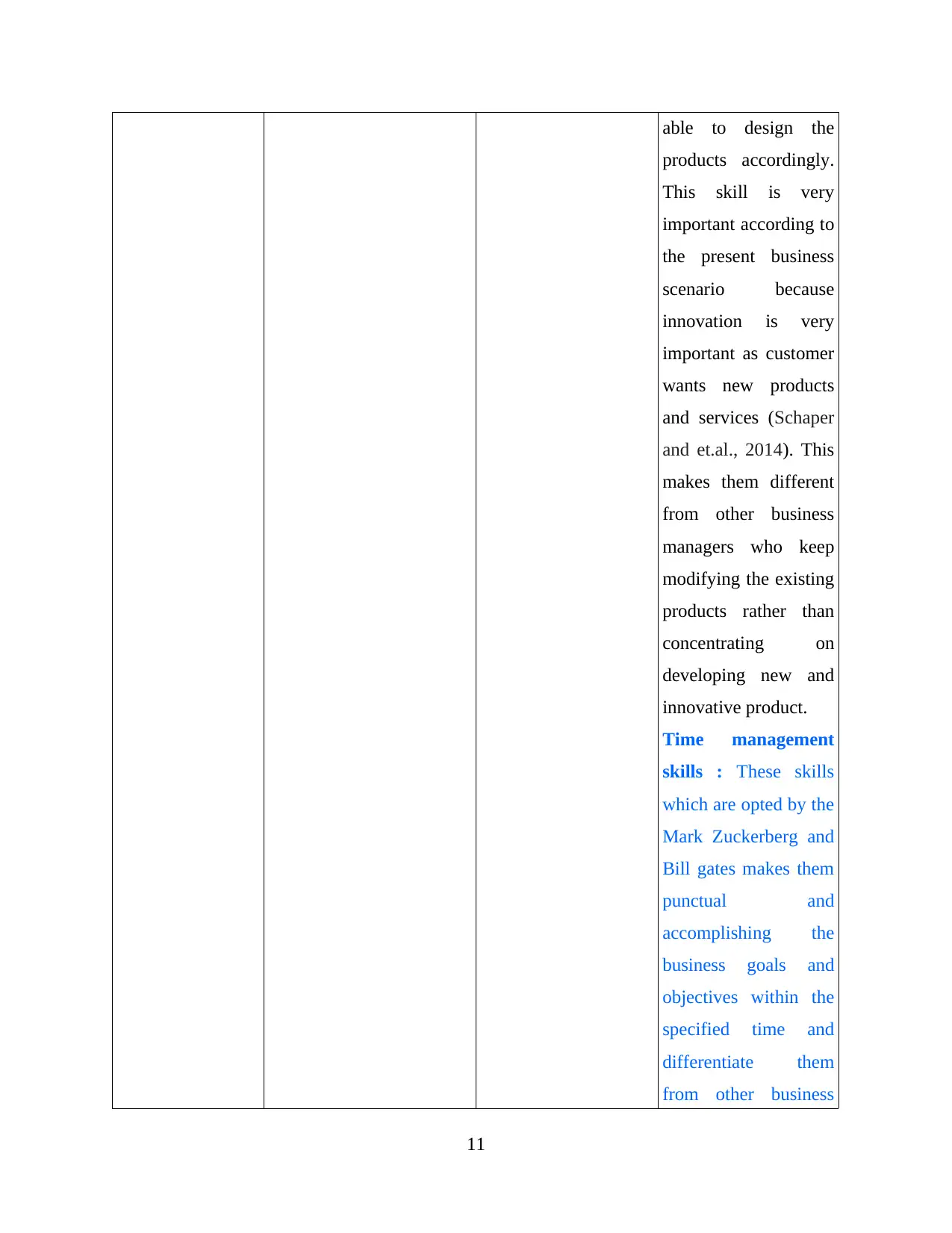
able to design the
products accordingly.
This skill is very
important according to
the present business
scenario because
innovation is very
important as customer
wants new products
and services (Schaper
and et.al., 2014). This
makes them different
from other business
managers who keep
modifying the existing
products rather than
concentrating on
developing new and
innovative product.
Time management
skills : These skills
which are opted by the
Mark Zuckerberg and
Bill gates makes them
punctual and
accomplishing the
business goals and
objectives within the
specified time and
differentiate them
from other business
11
products accordingly.
This skill is very
important according to
the present business
scenario because
innovation is very
important as customer
wants new products
and services (Schaper
and et.al., 2014). This
makes them different
from other business
managers who keep
modifying the existing
products rather than
concentrating on
developing new and
innovative product.
Time management
skills : These skills
which are opted by the
Mark Zuckerberg and
Bill gates makes them
punctual and
accomplishing the
business goals and
objectives within the
specified time and
differentiate them
from other business
11
Paraphrase This Document
Need a fresh take? Get an instant paraphrase of this document with our AI Paraphraser
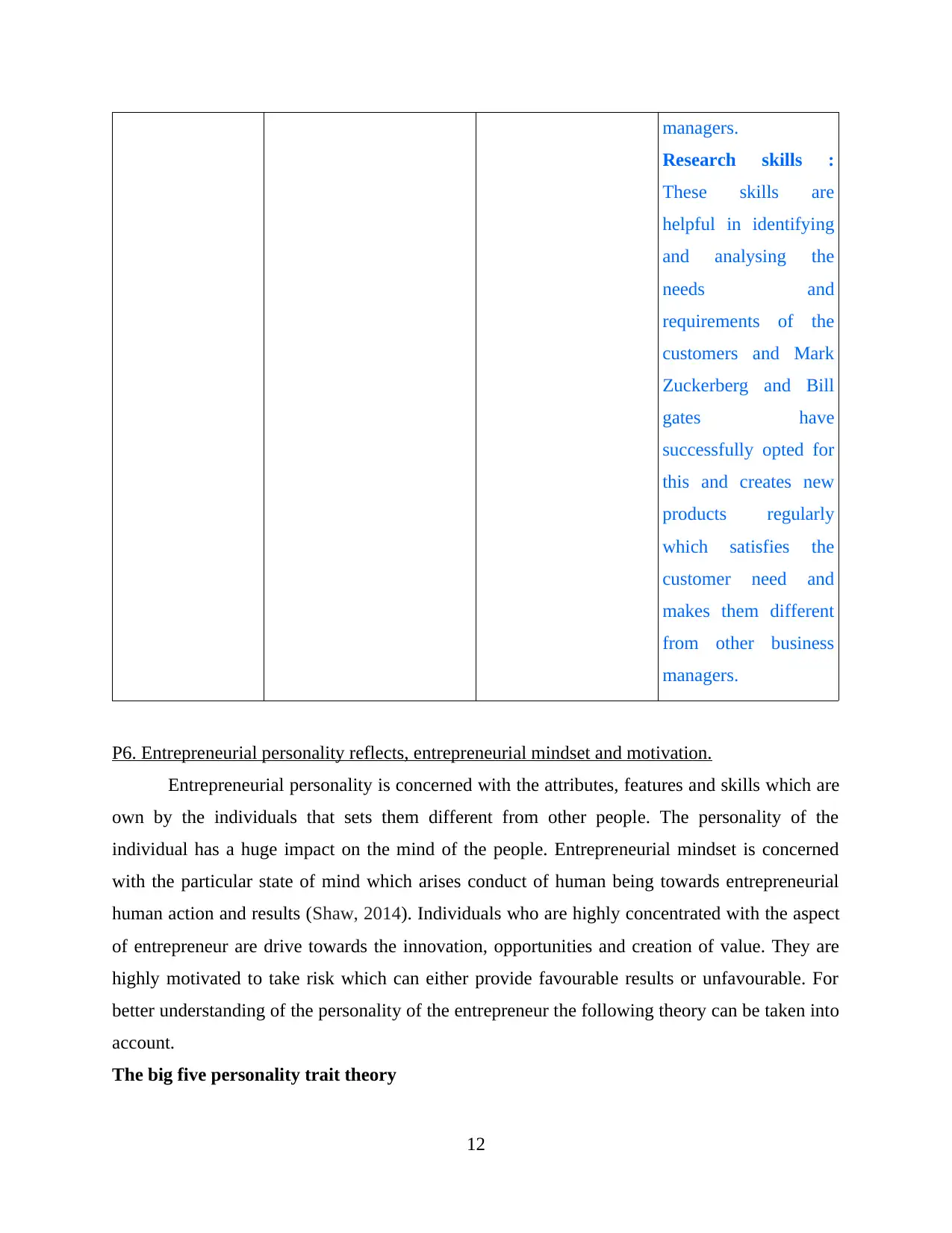
managers.
Research skills :
These skills are
helpful in identifying
and analysing the
needs and
requirements of the
customers and Mark
Zuckerberg and Bill
gates have
successfully opted for
this and creates new
products regularly
which satisfies the
customer need and
makes them different
from other business
managers.
P6. Entrepreneurial personality reflects, entrepreneurial mindset and motivation.
Entrepreneurial personality is concerned with the attributes, features and skills which are
own by the individuals that sets them different from other people. The personality of the
individual has a huge impact on the mind of the people. Entrepreneurial mindset is concerned
with the particular state of mind which arises conduct of human being towards entrepreneurial
human action and results (Shaw, 2014). Individuals who are highly concentrated with the aspect
of entrepreneur are drive towards the innovation, opportunities and creation of value. They are
highly motivated to take risk which can either provide favourable results or unfavourable. For
better understanding of the personality of the entrepreneur the following theory can be taken into
account.
The big five personality trait theory
12
Research skills :
These skills are
helpful in identifying
and analysing the
needs and
requirements of the
customers and Mark
Zuckerberg and Bill
gates have
successfully opted for
this and creates new
products regularly
which satisfies the
customer need and
makes them different
from other business
managers.
P6. Entrepreneurial personality reflects, entrepreneurial mindset and motivation.
Entrepreneurial personality is concerned with the attributes, features and skills which are
own by the individuals that sets them different from other people. The personality of the
individual has a huge impact on the mind of the people. Entrepreneurial mindset is concerned
with the particular state of mind which arises conduct of human being towards entrepreneurial
human action and results (Shaw, 2014). Individuals who are highly concentrated with the aspect
of entrepreneur are drive towards the innovation, opportunities and creation of value. They are
highly motivated to take risk which can either provide favourable results or unfavourable. For
better understanding of the personality of the entrepreneur the following theory can be taken into
account.
The big five personality trait theory
12
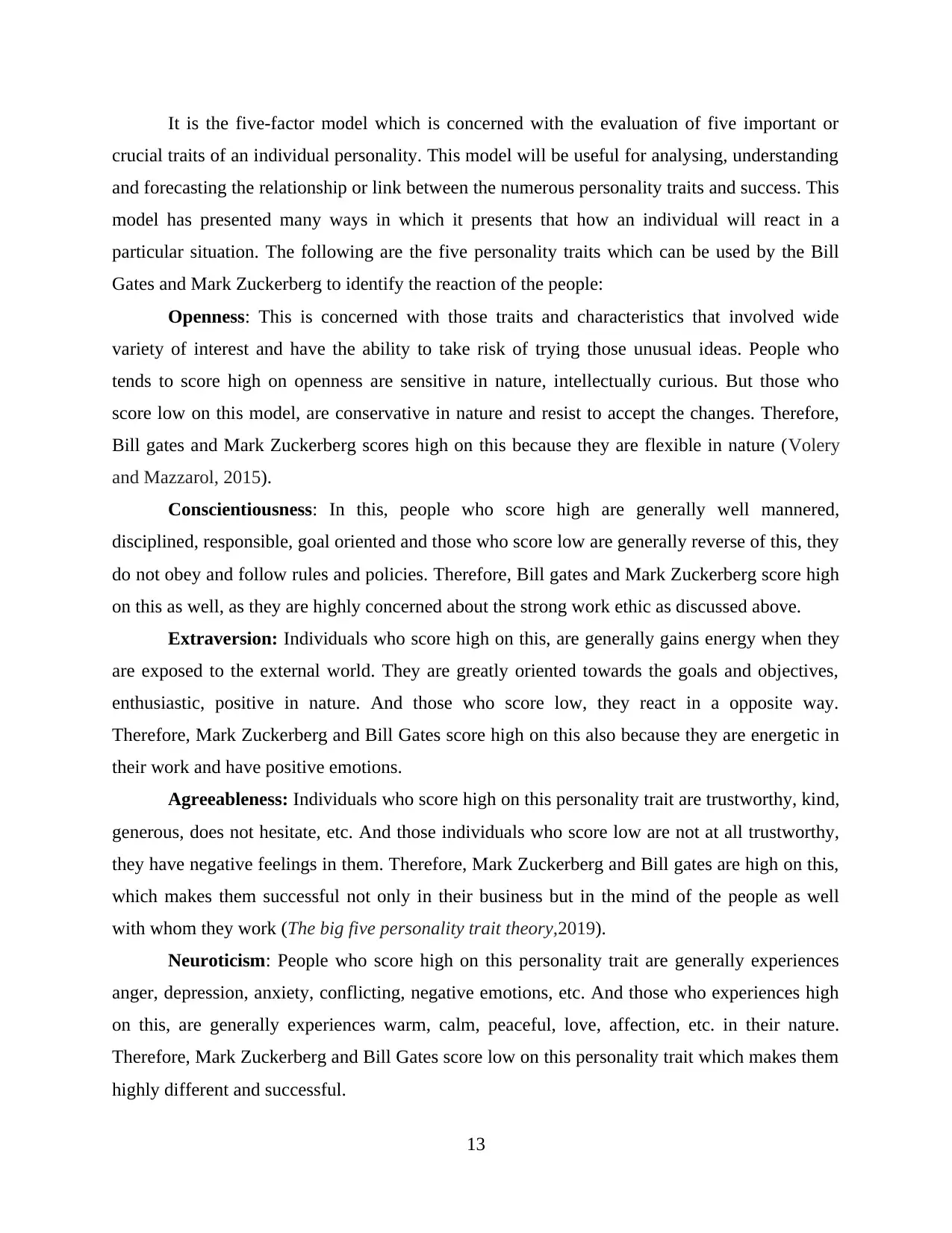
It is the five-factor model which is concerned with the evaluation of five important or
crucial traits of an individual personality. This model will be useful for analysing, understanding
and forecasting the relationship or link between the numerous personality traits and success. This
model has presented many ways in which it presents that how an individual will react in a
particular situation. The following are the five personality traits which can be used by the Bill
Gates and Mark Zuckerberg to identify the reaction of the people:
Openness: This is concerned with those traits and characteristics that involved wide
variety of interest and have the ability to take risk of trying those unusual ideas. People who
tends to score high on openness are sensitive in nature, intellectually curious. But those who
score low on this model, are conservative in nature and resist to accept the changes. Therefore,
Bill gates and Mark Zuckerberg scores high on this because they are flexible in nature (Volery
and Mazzarol, 2015).
Conscientiousness: In this, people who score high are generally well mannered,
disciplined, responsible, goal oriented and those who score low are generally reverse of this, they
do not obey and follow rules and policies. Therefore, Bill gates and Mark Zuckerberg score high
on this as well, as they are highly concerned about the strong work ethic as discussed above.
Extraversion: Individuals who score high on this, are generally gains energy when they
are exposed to the external world. They are greatly oriented towards the goals and objectives,
enthusiastic, positive in nature. And those who score low, they react in a opposite way.
Therefore, Mark Zuckerberg and Bill Gates score high on this also because they are energetic in
their work and have positive emotions.
Agreeableness: Individuals who score high on this personality trait are trustworthy, kind,
generous, does not hesitate, etc. And those individuals who score low are not at all trustworthy,
they have negative feelings in them. Therefore, Mark Zuckerberg and Bill gates are high on this,
which makes them successful not only in their business but in the mind of the people as well
with whom they work (The big five personality trait theory,2019).
Neuroticism: People who score high on this personality trait are generally experiences
anger, depression, anxiety, conflicting, negative emotions, etc. And those who experiences high
on this, are generally experiences warm, calm, peaceful, love, affection, etc. in their nature.
Therefore, Mark Zuckerberg and Bill Gates score low on this personality trait which makes them
highly different and successful.
13
crucial traits of an individual personality. This model will be useful for analysing, understanding
and forecasting the relationship or link between the numerous personality traits and success. This
model has presented many ways in which it presents that how an individual will react in a
particular situation. The following are the five personality traits which can be used by the Bill
Gates and Mark Zuckerberg to identify the reaction of the people:
Openness: This is concerned with those traits and characteristics that involved wide
variety of interest and have the ability to take risk of trying those unusual ideas. People who
tends to score high on openness are sensitive in nature, intellectually curious. But those who
score low on this model, are conservative in nature and resist to accept the changes. Therefore,
Bill gates and Mark Zuckerberg scores high on this because they are flexible in nature (Volery
and Mazzarol, 2015).
Conscientiousness: In this, people who score high are generally well mannered,
disciplined, responsible, goal oriented and those who score low are generally reverse of this, they
do not obey and follow rules and policies. Therefore, Bill gates and Mark Zuckerberg score high
on this as well, as they are highly concerned about the strong work ethic as discussed above.
Extraversion: Individuals who score high on this, are generally gains energy when they
are exposed to the external world. They are greatly oriented towards the goals and objectives,
enthusiastic, positive in nature. And those who score low, they react in a opposite way.
Therefore, Mark Zuckerberg and Bill Gates score high on this also because they are energetic in
their work and have positive emotions.
Agreeableness: Individuals who score high on this personality trait are trustworthy, kind,
generous, does not hesitate, etc. And those individuals who score low are not at all trustworthy,
they have negative feelings in them. Therefore, Mark Zuckerberg and Bill gates are high on this,
which makes them successful not only in their business but in the mind of the people as well
with whom they work (The big five personality trait theory,2019).
Neuroticism: People who score high on this personality trait are generally experiences
anger, depression, anxiety, conflicting, negative emotions, etc. And those who experiences high
on this, are generally experiences warm, calm, peaceful, love, affection, etc. in their nature.
Therefore, Mark Zuckerberg and Bill Gates score low on this personality trait which makes them
highly different and successful.
13
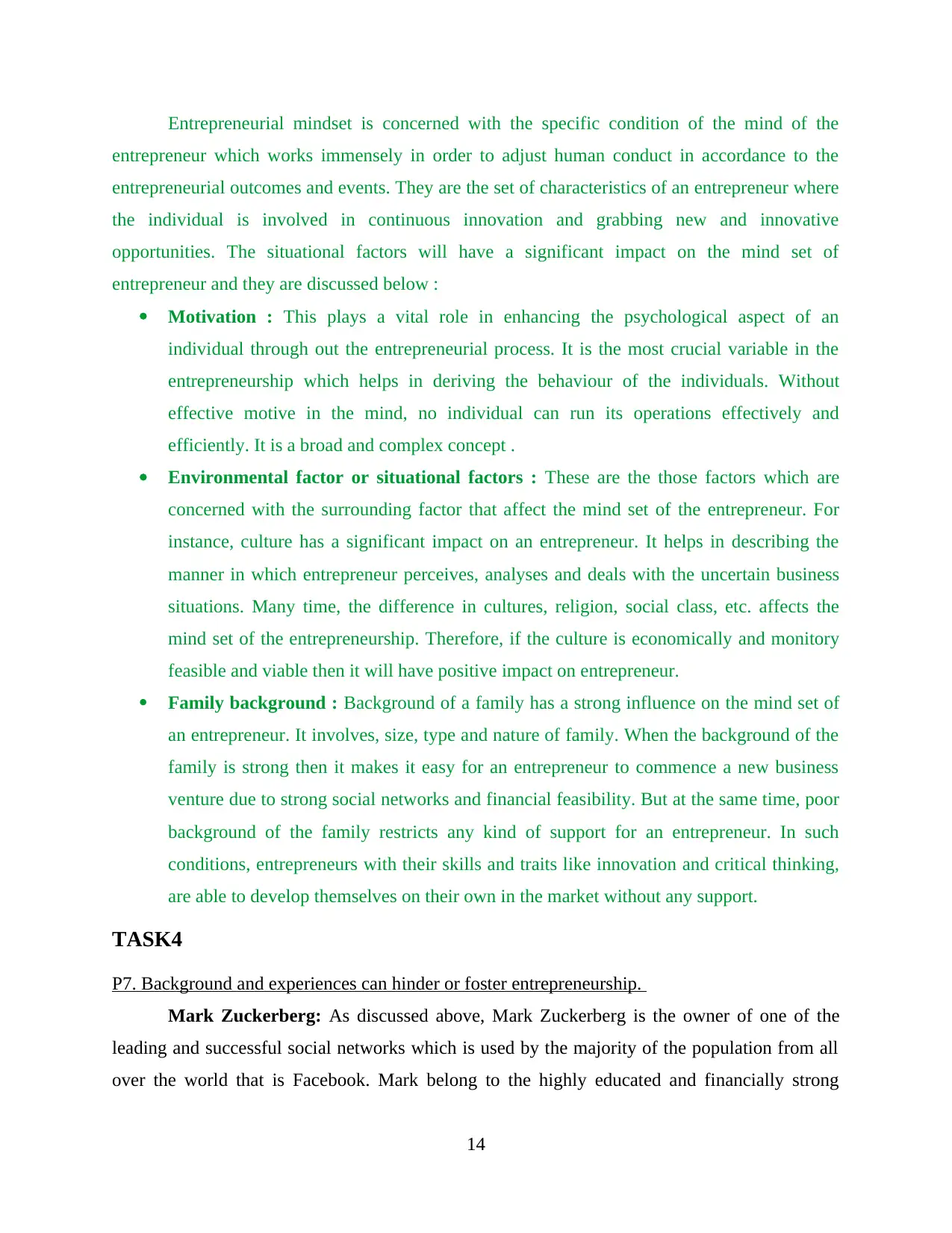
Entrepreneurial mindset is concerned with the specific condition of the mind of the
entrepreneur which works immensely in order to adjust human conduct in accordance to the
entrepreneurial outcomes and events. They are the set of characteristics of an entrepreneur where
the individual is involved in continuous innovation and grabbing new and innovative
opportunities. The situational factors will have a significant impact on the mind set of
entrepreneur and they are discussed below :
Motivation : This plays a vital role in enhancing the psychological aspect of an
individual through out the entrepreneurial process. It is the most crucial variable in the
entrepreneurship which helps in deriving the behaviour of the individuals. Without
effective motive in the mind, no individual can run its operations effectively and
efficiently. It is a broad and complex concept .
Environmental factor or situational factors : These are the those factors which are
concerned with the surrounding factor that affect the mind set of the entrepreneur. For
instance, culture has a significant impact on an entrepreneur. It helps in describing the
manner in which entrepreneur perceives, analyses and deals with the uncertain business
situations. Many time, the difference in cultures, religion, social class, etc. affects the
mind set of the entrepreneurship. Therefore, if the culture is economically and monitory
feasible and viable then it will have positive impact on entrepreneur.
Family background : Background of a family has a strong influence on the mind set of
an entrepreneur. It involves, size, type and nature of family. When the background of the
family is strong then it makes it easy for an entrepreneur to commence a new business
venture due to strong social networks and financial feasibility. But at the same time, poor
background of the family restricts any kind of support for an entrepreneur. In such
conditions, entrepreneurs with their skills and traits like innovation and critical thinking,
are able to develop themselves on their own in the market without any support.
TASK4
P7. Background and experiences can hinder or foster entrepreneurship.
Mark Zuckerberg: As discussed above, Mark Zuckerberg is the owner of one of the
leading and successful social networks which is used by the majority of the population from all
over the world that is Facebook. Mark belong to the highly educated and financially strong
14
entrepreneur which works immensely in order to adjust human conduct in accordance to the
entrepreneurial outcomes and events. They are the set of characteristics of an entrepreneur where
the individual is involved in continuous innovation and grabbing new and innovative
opportunities. The situational factors will have a significant impact on the mind set of
entrepreneur and they are discussed below :
Motivation : This plays a vital role in enhancing the psychological aspect of an
individual through out the entrepreneurial process. It is the most crucial variable in the
entrepreneurship which helps in deriving the behaviour of the individuals. Without
effective motive in the mind, no individual can run its operations effectively and
efficiently. It is a broad and complex concept .
Environmental factor or situational factors : These are the those factors which are
concerned with the surrounding factor that affect the mind set of the entrepreneur. For
instance, culture has a significant impact on an entrepreneur. It helps in describing the
manner in which entrepreneur perceives, analyses and deals with the uncertain business
situations. Many time, the difference in cultures, religion, social class, etc. affects the
mind set of the entrepreneurship. Therefore, if the culture is economically and monitory
feasible and viable then it will have positive impact on entrepreneur.
Family background : Background of a family has a strong influence on the mind set of
an entrepreneur. It involves, size, type and nature of family. When the background of the
family is strong then it makes it easy for an entrepreneur to commence a new business
venture due to strong social networks and financial feasibility. But at the same time, poor
background of the family restricts any kind of support for an entrepreneur. In such
conditions, entrepreneurs with their skills and traits like innovation and critical thinking,
are able to develop themselves on their own in the market without any support.
TASK4
P7. Background and experiences can hinder or foster entrepreneurship.
Mark Zuckerberg: As discussed above, Mark Zuckerberg is the owner of one of the
leading and successful social networks which is used by the majority of the population from all
over the world that is Facebook. Mark belong to the highly educated and financially strong
14
Secure Best Marks with AI Grader
Need help grading? Try our AI Grader for instant feedback on your assignments.
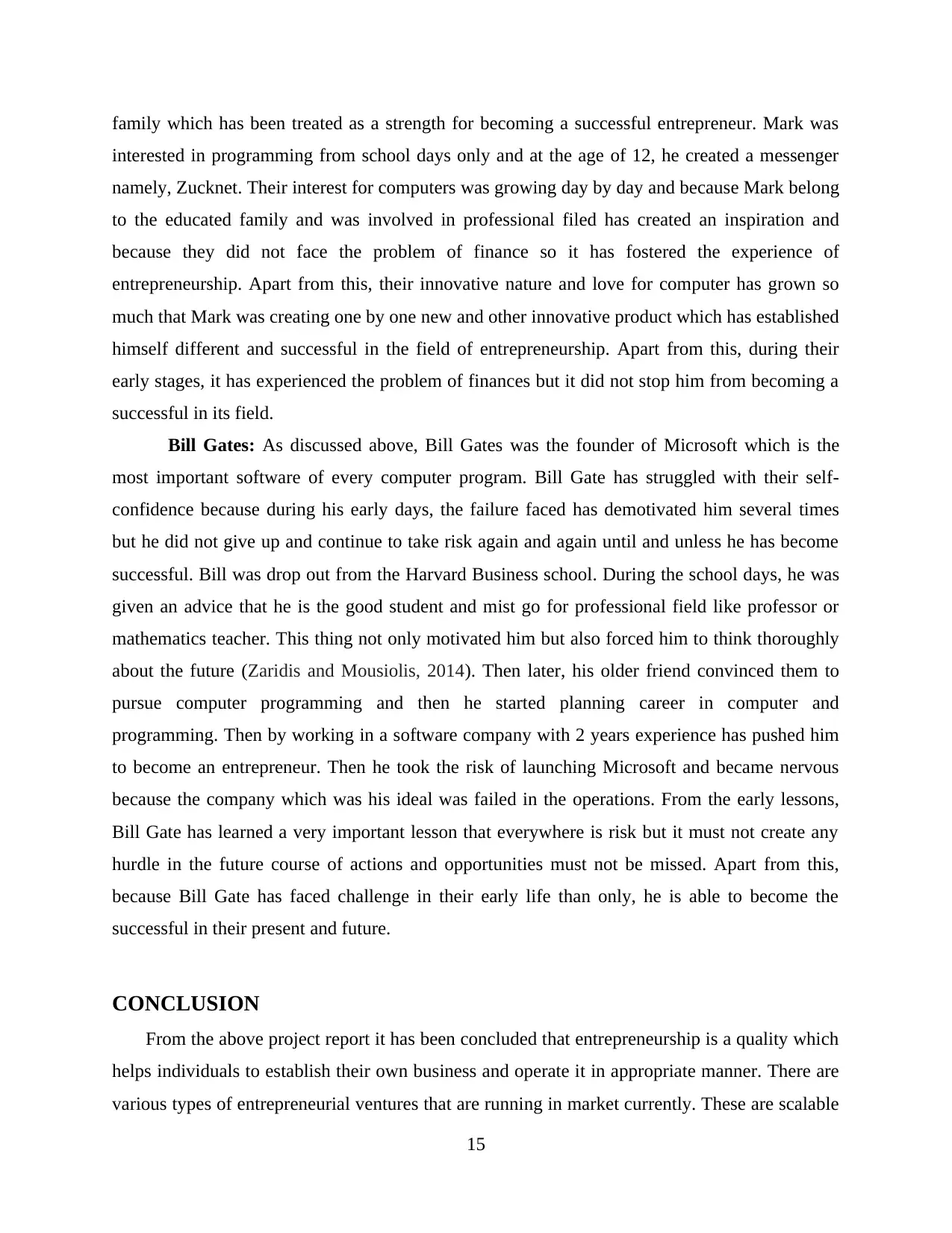
family which has been treated as a strength for becoming a successful entrepreneur. Mark was
interested in programming from school days only and at the age of 12, he created a messenger
namely, Zucknet. Their interest for computers was growing day by day and because Mark belong
to the educated family and was involved in professional filed has created an inspiration and
because they did not face the problem of finance so it has fostered the experience of
entrepreneurship. Apart from this, their innovative nature and love for computer has grown so
much that Mark was creating one by one new and other innovative product which has established
himself different and successful in the field of entrepreneurship. Apart from this, during their
early stages, it has experienced the problem of finances but it did not stop him from becoming a
successful in its field.
Bill Gates: As discussed above, Bill Gates was the founder of Microsoft which is the
most important software of every computer program. Bill Gate has struggled with their self-
confidence because during his early days, the failure faced has demotivated him several times
but he did not give up and continue to take risk again and again until and unless he has become
successful. Bill was drop out from the Harvard Business school. During the school days, he was
given an advice that he is the good student and mist go for professional field like professor or
mathematics teacher. This thing not only motivated him but also forced him to think thoroughly
about the future (Zaridis and Mousiolis, 2014). Then later, his older friend convinced them to
pursue computer programming and then he started planning career in computer and
programming. Then by working in a software company with 2 years experience has pushed him
to become an entrepreneur. Then he took the risk of launching Microsoft and became nervous
because the company which was his ideal was failed in the operations. From the early lessons,
Bill Gate has learned a very important lesson that everywhere is risk but it must not create any
hurdle in the future course of actions and opportunities must not be missed. Apart from this,
because Bill Gate has faced challenge in their early life than only, he is able to become the
successful in their present and future.
CONCLUSION
From the above project report it has been concluded that entrepreneurship is a quality which
helps individuals to establish their own business and operate it in appropriate manner. There are
various types of entrepreneurial ventures that are running in market currently. These are scalable
15
interested in programming from school days only and at the age of 12, he created a messenger
namely, Zucknet. Their interest for computers was growing day by day and because Mark belong
to the educated family and was involved in professional filed has created an inspiration and
because they did not face the problem of finance so it has fostered the experience of
entrepreneurship. Apart from this, their innovative nature and love for computer has grown so
much that Mark was creating one by one new and other innovative product which has established
himself different and successful in the field of entrepreneurship. Apart from this, during their
early stages, it has experienced the problem of finances but it did not stop him from becoming a
successful in its field.
Bill Gates: As discussed above, Bill Gates was the founder of Microsoft which is the
most important software of every computer program. Bill Gate has struggled with their self-
confidence because during his early days, the failure faced has demotivated him several times
but he did not give up and continue to take risk again and again until and unless he has become
successful. Bill was drop out from the Harvard Business school. During the school days, he was
given an advice that he is the good student and mist go for professional field like professor or
mathematics teacher. This thing not only motivated him but also forced him to think thoroughly
about the future (Zaridis and Mousiolis, 2014). Then later, his older friend convinced them to
pursue computer programming and then he started planning career in computer and
programming. Then by working in a software company with 2 years experience has pushed him
to become an entrepreneur. Then he took the risk of launching Microsoft and became nervous
because the company which was his ideal was failed in the operations. From the early lessons,
Bill Gate has learned a very important lesson that everywhere is risk but it must not create any
hurdle in the future course of actions and opportunities must not be missed. Apart from this,
because Bill Gate has faced challenge in their early life than only, he is able to become the
successful in their present and future.
CONCLUSION
From the above project report it has been concluded that entrepreneurship is a quality which
helps individuals to establish their own business and operate it in appropriate manner. There are
various types of entrepreneurial ventures that are running in market currently. These are scalable
15
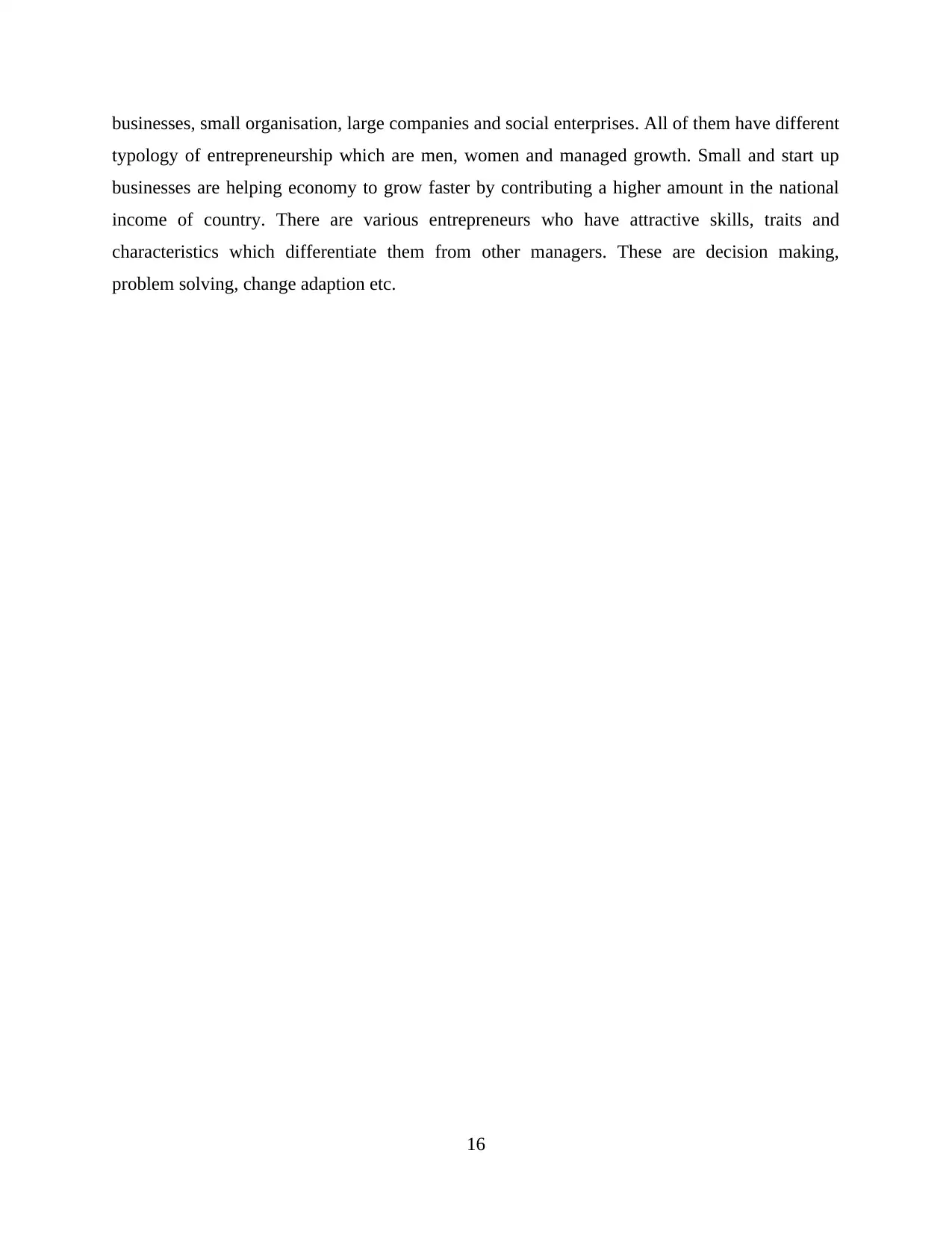
businesses, small organisation, large companies and social enterprises. All of them have different
typology of entrepreneurship which are men, women and managed growth. Small and start up
businesses are helping economy to grow faster by contributing a higher amount in the national
income of country. There are various entrepreneurs who have attractive skills, traits and
characteristics which differentiate them from other managers. These are decision making,
problem solving, change adaption etc.
16
typology of entrepreneurship which are men, women and managed growth. Small and start up
businesses are helping economy to grow faster by contributing a higher amount in the national
income of country. There are various entrepreneurs who have attractive skills, traits and
characteristics which differentiate them from other managers. These are decision making,
problem solving, change adaption etc.
16
1 out of 18
Related Documents
Your All-in-One AI-Powered Toolkit for Academic Success.
+13062052269
info@desklib.com
Available 24*7 on WhatsApp / Email
![[object Object]](/_next/static/media/star-bottom.7253800d.svg)
Unlock your academic potential
© 2024 | Zucol Services PVT LTD | All rights reserved.




